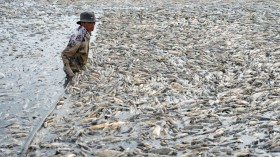According to a survey on climate change, the most recent U.N. Researchers' studies have proved that some global warming measures are already inescapable, and current research efforts concentrate on mitigation and adaptation options.
Researchers at the National Oceanic and Atmospheric Administration are also helping to better understand and prepare for climate change by providing data, tools, and information. The frequency of flash flooding occurrences and the places where they most frequently occur are influenced by the changing environment.

Also Read: Is Climate Change Accelerating Ocean Currents?
Intensive Research
A research team led by the University of Oklahoma has created simulations from coupled climate and hydrologic models that show widespread increases in the occurrences of flash flooding events across most of the United States. They worked with the NOAA National Severe Storms Laboratory and collaborators at the National Center for Atmospheric Research.
Yang Hong, an associate professor of hydrology and remote sensing in the O.U. School of Civil Engineering and Environmental Sciences and the School of Meteorology is the study's lead author. He is the founding director of the O.U.'s online master's program in hydrology and water security and the head of the Hydrometeorology and Remote Sensing Laboratory.
The study team's findings were published in Nature: Communications Earth and Environment, with the first author being Zhi Li, a Ph.D. student at the HyDROS Lab.
"This research relies on the state-of-the-art model (EF5/CREST) built in conjunction with experts from O.U., NASA, and NOAA's National Severe Storms Laboratory, and has begun work with climate scientists from the National Center for Atmospheric Research," said Li
"It realizes the notion of a 'Digital Twin in Earth System Science,' where one is our living climate, and the other is our future, and climate change never felt so real to me until we successfully worked on such research."
Needing More Evidence

The researchers utilized climate simulations and modeling over 30 years, from 2070 to 2100, to estimate where and how flash floods occur. The impact, dubbed "flashiness" by the researchers, indicates the chance of meteorological conditions that might result in fast rainfall and flash floods.
They discovered that if present emissions levels are maintained, flooding episodes will become 7.9% "flashier" by the end of the century, implying that extreme rainfall events will occur more frequently and in concentrated locations, increasing the risk of floods.
Similarly, their findings suggest that flash flooding has increased by more than 10% in the Southwest United States, the largest increase in "flashiness" among historical flash flood hot regions. With an 8.6% rise forecast, the central United States is becoming a new flash flood hotspot. Their findings indicate that future flash flood-prone areas will be shifted northward.
"More people will have to learn how to survive floods and how to live better with ever-increasing flash floods," Hong added.
Ray of Hope

There is still time to mitigate some of the more severe consequences. Climate mitigation techniques, according to Gourley, might assist.
He suggested that now is the time to start thinking about stronger flood defenses. "Of course, lowering greenhouse gas concentrations is the ideal solution, but we can think about strategies to lessen vulnerabilities and increase flash flooding safety education in the meanwhile."
"The bulk of fatalities associated with flash floods are caused by people discovering floods, not finding people," he noted. "They're usually driving through flooded streets."
Staying off the roadways and avoiding standing water is the greatest way to be safe during flash flooding.
Related Article: Researchers Discovers Importance of Carbon Cycle in Predicting Climate Change
For similar news, don't forget to follow Nature World News!
© 2024 NatureWorldNews.com All rights reserved. Do not reproduce without permission.





